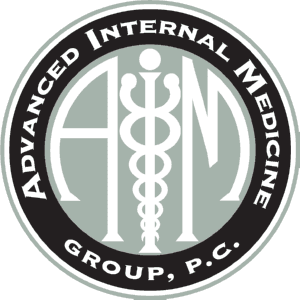Primary health care is the first level of contact for individuals and their families with a healthcare provider. The goal is to address the main health problems of a person including diagnosing, providing treatment, referring to specialists, or prescribing medication. It is the first stop for most healthcare concerns, from sprained ankles to chronic conditions.
Primary care includes preventive care which is meant to help keep people from getting sick or prevent symptoms or conditions from worsening. It also often includes things like vaccines and bloodwork.
How Primary Care Helps Keep You Healthy
As the first level of contact, experienced and knowledgeable primary care physicians like the Advanced Internal Medicine Group team are critical to the prevention and early detection of many illnesses and conditions. With regular semi-annual screenings, your doctors can help you prevent health problems or diagnose a condition and provide treatment early. Preventative medicine is the best way to minimize symptoms and avoid developing chronic issues in the future. In addition, getting early treatment for most conditions can have a tremendous impact on your health.
Secondly, building a relationship & history with your primary healthcare provider can make talking about health and receiving treatment easier. Visiting a new doctor can be a challenge. Instead, following up with a physician that knows your medical history and is well-informed about other medical issues or developing conditions can track your healing progress or worsening symptoms. Visiting a doctor without experience treating your specific symptoms and illness can lead to prolonged testing and observation times causing worsening symptoms as you wait. The AIM Group physicians take pride in their long-standing relationships with many patients from adulthood into retirement age. The AIM Group also provides specialized geriatric treatments which are not offered by many other doctors or facilities.
Lower Healthcare Costs
Studies show that healthcare systems that prioritize primary care deliver better value to patients in the long term. Not only are patients more likely to have better outcomes, but early treatment can lead to faster recovery times and significant savings in treatment costs and wage loss.
It’s easy to understand that when people are healthier, treatment costs are less. For instance, if a preventative mammogram catches breast cancer early, treatment can be administered earlier. If regular bloodwork shows early signs of diabetes, a primary healthcare provider can help you make lifestyle changes to avoid diabetes altogether. As Benjamin Franklin once said, “an ounce of prevention is worth a pound of cure.”
10 Most Common Diagnoses From Primary Care Physicians
1. Essential (primary) hypertension: For many adults, hypertension, commonly known as High Blood Pressure, there is no identifiable cause of high blood pressure. This type of hypertension tends to develop gradually over many years.
2. Hyperlipidemia: Hyperlipidemia means your blood has too many lipids (or fats), such as cholesterol and triglycerides. Hypercholesterolemia, means you have too much non-HDL cholesterol and LDL (bad) cholesterol in your blood. Left untreated, this condition increases fatty deposits in arteries and increases the risk of blockages.
3. Type 2 diabetes mellitus: Type 2 diabetes is a chronic disease. It is characterized by high levels of sugar in the blood. It can cause symptoms like excessive thirst, frequent urination, and fatigue. It can also increase your risk of getting serious problems with your eyes, heart, and nerves.
4. Routine Medical Examination: Sometimes a concern is just a mild issue that is resolved easily without medical intervention. This also includes routine examinations such as bloodwork.
5. Immunization: Increasingly common are immunizations including the yearly flu vaccine as well as the Covid-19 vaccine. Vaccinations are substances used to stimulate the production of antibodies and provide immunity against one or several diseases without inducing the disease.
6. Hypothyroidism: Hypothyroidism or underactive thyroid is a condition in which your thyroid gland does not produce enough of certain crucial hormones.
7. Gastro-esophageal reflux disease (GERD): Occurs when stomach acid repeatedly flows back into the esophagus. This backwash (acid reflux) can irritate the lining of your esophagus.
8. Mixed hyperlipidemia: A hereditary condition that causes elevated levels of fats in the blood, such as low-density lipoprotein (LDL) cholesterol (“bad” cholesterol) and triglycerides.
9. Exposure to COVID-19: Many visits include a rapid COVID test for same-day results, or a more accurate molecular lab test (PCR/NAAT) for results within days. Early detection can minimize symptoms and prevent the spread of the virus.
10. Atherosclerotic heart disease: Occurs when a buildup of fats, cholesterol, and other substances (called plaque) in the artery walls causes the arteries to narrow. This blocks blood flow and may develop into a blood clot.

